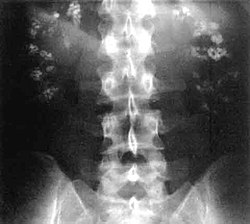Renal tubular acidosis
Editor-In-Chief: Prab R Tumpati, MD
Obesity, Sleep & Internal medicine
Founder, WikiMD Wellnesspedia &
W8MD medical weight loss NYC and sleep center NYC
| Renal tubular acidosis | |
|---|---|

| |
| Synonyms | N/A |
| Pronounce | N/A |
| Specialty | N/A |
| Symptoms | Fatigue, muscle weakness, polyuria, polydipsia, growth retardation in children |
| Complications | Nephrocalcinosis, kidney stones, chronic kidney disease |
| Onset | Variable, depending on type |
| Duration | Chronic |
| Types | Type 1, Type 2, Type 3, Type 4 |
| Causes | Genetic mutations, autoimmune diseases, medications |
| Risks | Family history, certain autoimmune disorders |
| Diagnosis | Blood tests, urinalysis, urine pH |
| Differential diagnosis | Metabolic acidosis, chronic kidney disease, Bartter syndrome, Gitelman syndrome |
| Prevention | N/A |
| Treatment | Bicarbonate supplements, potassium supplements, dietary modifications |
| Medication | Sodium bicarbonate, potassium citrate |
| Prognosis | Variable, depending on type and treatment |
| Frequency | Rare |
| Deaths | N/A |
Renal tubular acidosis (RTA) is a medical condition that involves an accumulation of acid in the body due to a failure of the kidneys to appropriately acidify the urine. When the body performs normal metabolic processes, it produces acid. If this acid is not removed or neutralized, the blood will become too acidic. This can lead to electrolyte and fluid imbalances, which can cause symptoms and complications.
Types
There are three main types of RTA, each with different causes and treatments. These are:
- Type 1 RTA (or distal RTA): This type is caused by a failure of the acid secretion by the alpha intercalated cells of the cortical collecting duct of the distal nephron. This can be due to a variety of causes, including genetic mutations and autoimmune diseases.
- Type 2 RTA (or proximal RTA): This type is caused by a failure of the proximal tubular cells to reabsorb filtered bicarbonate from the urine, leading to excessive bicarbonate loss. This can be due to genetic disorders, kidney diseases, or certain medications.
- Type 4 RTA (or hyperkalemic RTA): This type is caused by a failure of the kidneys to excrete potassium, leading to hyperkalemia (high blood potassium levels). This can be due to adrenal gland disorders, certain medications, or chronic kidney disease.
Symptoms
The symptoms of RTA can vary depending on the type and severity of the condition. Common symptoms can include:
- Fatigue
- Muscle weakness
- Nausea and vomiting
- Frequent urination
- Increased thirst
- Confusion or decreased alertness
Diagnosis
The diagnosis of RTA is typically made based on the patient's symptoms, medical history, and laboratory tests. These tests can include blood tests, urine tests, and sometimes genetic testing.
Treatment
The treatment of RTA typically involves correcting the acid-base imbalance with alkali therapy, treating the underlying cause of the condition, and managing any complications.
See also
Transform your life with W8MD's budget GLP-1 injections from $125.
W8MD offers a medical weight loss program to lose weight in Philadelphia. Our physician-supervised medical weight loss provides:
- Most insurances accepted or discounted self-pay rates. We will obtain insurance prior authorizations if needed.
- Generic GLP1 weight loss injections from $125 for the starting dose.
- Also offer prescription weight loss medications including Phentermine, Qsymia, Diethylpropion, Contrave etc.
NYC weight loss doctor appointments
Start your NYC weight loss journey today at our NYC medical weight loss and Philadelphia medical weight loss clinics.
- Call 718-946-5500 to lose weight in NYC or for medical weight loss in Philadelphia 215-676-2334.
- Tags:NYC medical weight loss, Philadelphia lose weight Zepbound NYC, Budget GLP1 weight loss injections, Wegovy Philadelphia, Wegovy NYC, Philadelphia medical weight loss, Brookly weight loss and Wegovy NYC
|
WikiMD's Wellness Encyclopedia |
| Let Food Be Thy Medicine Medicine Thy Food - Hippocrates |
Medical Disclaimer: WikiMD is not a substitute for professional medical advice. The information on WikiMD is provided as an information resource only, may be incorrect, outdated or misleading, and is not to be used or relied on for any diagnostic or treatment purposes. Please consult your health care provider before making any healthcare decisions or for guidance about a specific medical condition. WikiMD expressly disclaims responsibility, and shall have no liability, for any damages, loss, injury, or liability whatsoever suffered as a result of your reliance on the information contained in this site. By visiting this site you agree to the foregoing terms and conditions, which may from time to time be changed or supplemented by WikiMD. If you do not agree to the foregoing terms and conditions, you should not enter or use this site. See full disclaimer.
Credits:Most images are courtesy of Wikimedia commons, and templates, categories Wikipedia, licensed under CC BY SA or similar.
Contributors: Prab R. Tumpati, MD



